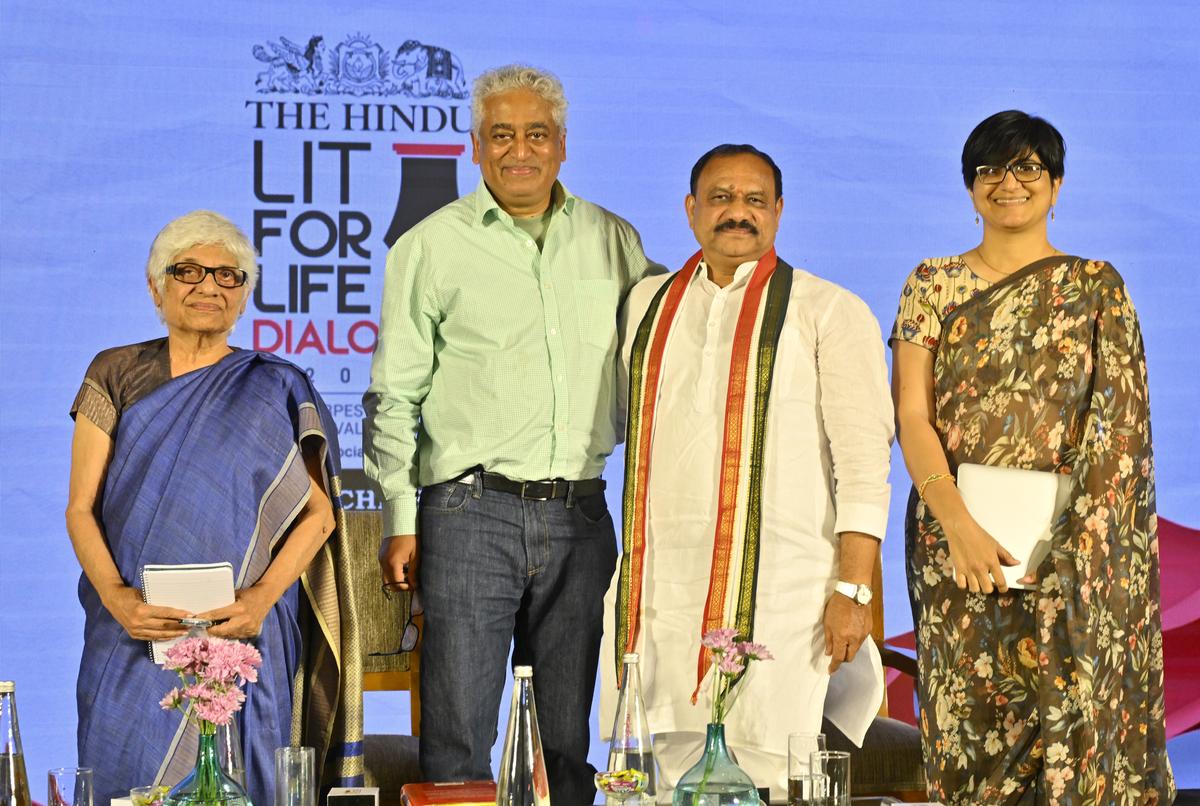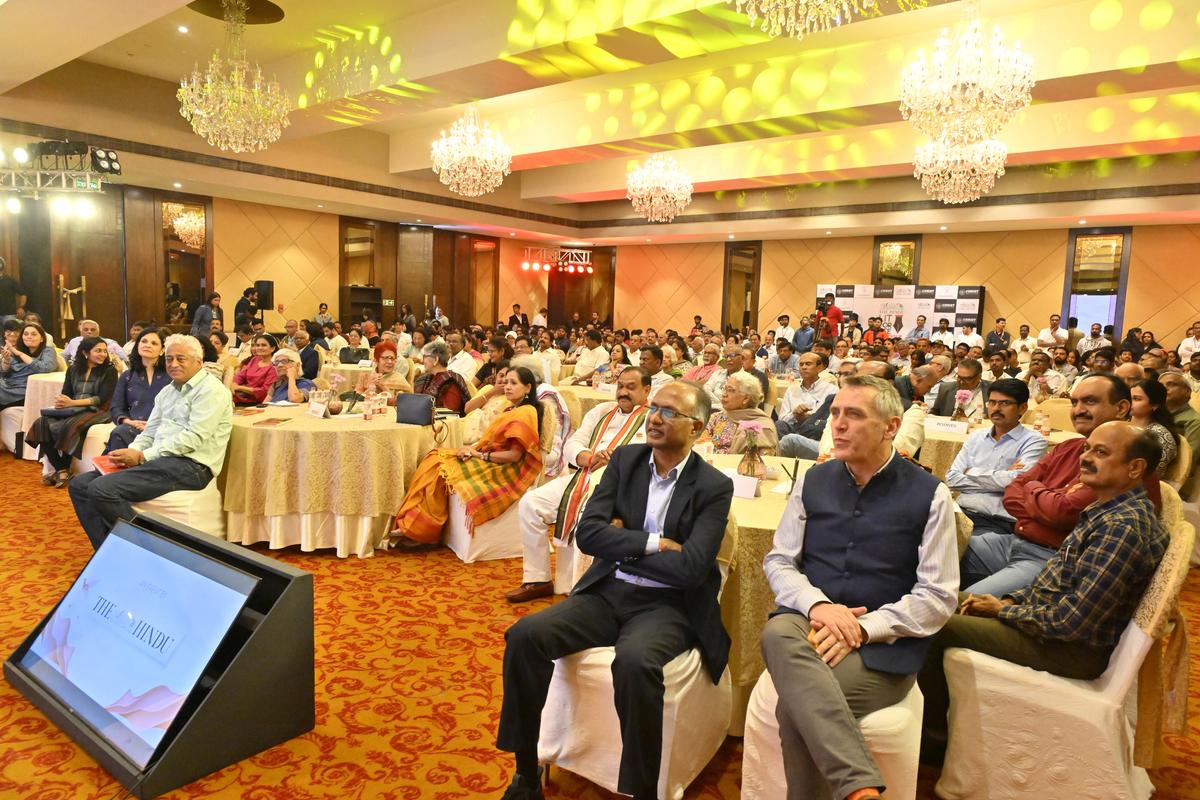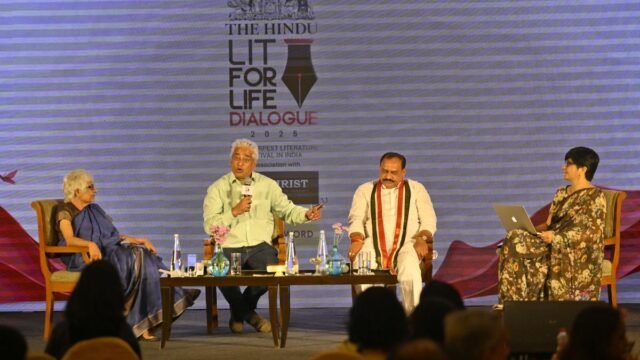
Political Commentator Neerja Chowdhury, eminent journalist Rajdeep Sardesai, Telangana Pradesh Congress Committee president B. Mahesh Kumar Goud in conversation with Senior Assistant Editor at The Hindu Swathi V. at The Hindu Lit for Life Dialogue 2025 held at Taj Deccan in Hyderabad on Friday.
| Photo Credit: NAGARA GOPAL
From the likelihood of the One Nation One Election (ONOE) becoming a reality, to the metamorphosing of the Indian elections into a polarising, hyperlocal and cash-intensive affairs to the Bharatiya Janata Party’s ability to bounce back from the electoral jolt in the 2024 parliamentary elections were some of the topics that held the audience in a spell at the Lit For Life Dialogue 2025 in Hyderabad on Friday evening.
The dialogue saw eminent journalists Neerja Chowdhury, Rajdeep Sardesai and Telangana Pradesh Congress Committee chief B. Mahesh Goud, sharing insights and at times trading barbs, during a panel discussion that was moderated by Swathi Vadlamudi of The Hindu.
Ms. Chowdhury opined that while ONOE was ‘not a bad idea’, it required a great deal of thought. While largely accepted by the middle class, the rural electorate seek an interface with political leaders as a method of mounting pressure on them to get civic, or similar work, done. “’For five years they will not show their face to us?’ So, their way of looking at it is very different,” she said, adding that ONOE requires ‘serious national debate’ from turning it into a demonetisation announcement. The larger unaddressed problem of ‘big money pervading our election, making them less than free and fair’ remains.

Political Commentator Neerja Chowdhury, Eminent Journalist Rajdeep Sardesai, Telangana Pradesh Congress Committee President, B. Mahesh Kumar Goud In conversation with Senior Assistant Editor at The Hindu Swathi V at The Hindu Lit for Life Dialogue 2025 held at Taj Deccan in Hyderabad on Friday.
| Photo Credit:
NAGARA GOPAL
Prime Minister Narendra Modi, Mr Sardesai said, by means of the ONOE, wanted to turn the country into a Presidential system of democracy. “He tried it in 2024, and as Neerja rightly said, the public said, ‘sorry, we are a diverse country’. Tamil Nadu thinks differently to Telangana. Telangana thinks differently to Karnataka, to Bengal to UP,” he said. He suggested that the ‘real reform’ was proportional representation, and the right to recall. He implied that ONOE was a diversion from other issues such as elections involving exorbitant amounts of money, which has ended the polls from being conducted on a level playing field.
Mr. Goud pointed out that the Congress has opposed ONOE as impractical, undemocratic and against the spirit of federalism. Each State, he said, should have a choice of conducting their elections.

A section of the crowd at The Hindu Lit for Life Dialogue 2025 held at Taj Deccan in Hyderabad on Friday.
| Photo Credit:
NAGARA GOPAL
Underscoring the essentiality of communication in politics, Mr. Sardesai pointed out that post-Rajiv Gandhi, people believe in certain levels of meritocracy. While dynasts exist across party lines, PM Modi has mastered the art of communicating to the new aspirational India.
Offering her analysis of the outcome of the Maharashtra assembly elections, Ms. Chowdhury said that the rise of women as a political force was being witnessed. The BJP, which course corrected quickly, embarked on ‘game changing’ social welfare schemes, especially for women. “The Ladki Bahin Yojna which gave to women ₹1,500 per month, they operationalised it in four months. If any government can do this, and they did this very efficiently in Maharashtra, then our governments can deliver anything,” she said. Women put this moneya to use which raised stature in their own eyes.
The Congress in Maharashtra, Mr. Sardesai said, became complacent. The BJP, on the other hand, was launching welfare schemes. The party also spent large sums of money, including on sarpanches. The Congress, meanwhile, was under the impression that it would win, and was engaged in deciding, June through September, who would be the Chief Minister.
Mr. Goud, while conceding to certain arguments, said that the BJP in Maharashtra succeeded in ‘manipulating’ alliances. That party also succeeded in making stalwarts defect. “They have dismantled the regional feelings,” and added that the Congress could not withstand BJP’s manipulation. He raised concerns about EVMs as well.
The panelists felt there was a lack of transparency on the part of the ECI, and it was losing credibility.
The panelists also raised concerns over the ‘pernicious’ role of religion in politics. “Once you bring religion into politics so directly, overly in such a toxic manner, you are playing with fire,” said Mr. Sardesai, adding such politics is played out in Pakistan. He also raised the ‘tragedy’ of not giving tickets to Muslims out of concern that Hindus would not vote for them.
Published – December 13, 2024 09:15 pm IST







